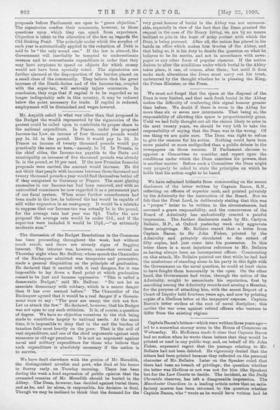The discussion of the Budget Resolutions in the Commons has
been proceeding throughout the week, but without much result, and there are already signs of flagging interest. The interest was, however, somewhat revived on Thursday night when Mr. Ball our, whose speech the Chancellor of the Exchequer admitted was temperate and persuasive, made a general disquisition on the principle of graduation. He declared that it carried with it real dangers, for it was Impossible to lay down a fixed point at which graduation ceased to be just and became oppressive. "This is called a democratic Budget," said Mr. Balfour. "Do not let us associate democracy with robbery, which is a nearer danger than it has ever seemed before." The Chancellor of the Exchequer agreed that it would be a real danger if a Govern- ment were to say : "The poor are many, the rich are few. Let us attack the few." He declared, however, that his Budget was not open to any such criticism. It is, of course, a question of degree. We have no objection ourselves to the rich being made to contribute largely to national needs. At the same time, it is impossible to deny that in the end the burden of taxation falls most heavily on the poor. That is the evil of vast expenditure, and one of the chief arguments against such measures as old-age pensions. It in not an argument against naval and military expenditure for those who believe that such expenditure is absolutely necessary if the nation is to survive.










































 Previous page
Previous page